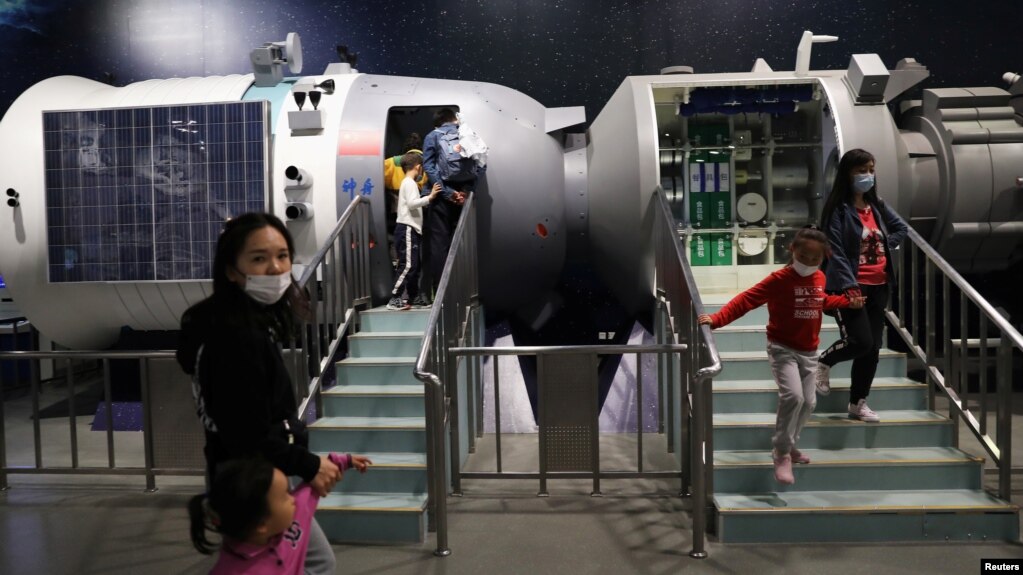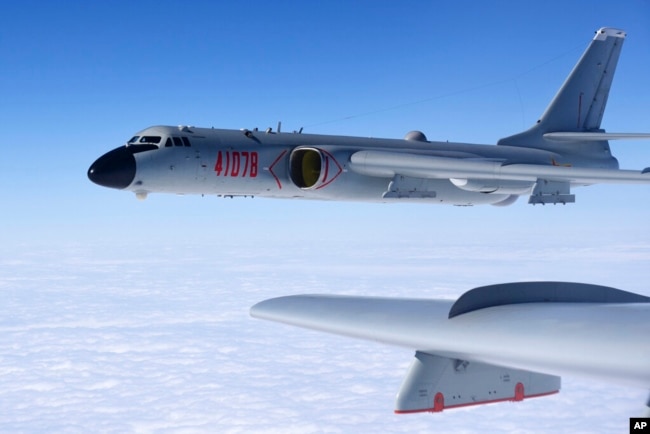
FILE – Visitors walk near an example space laboratory showing the development of China’s space exploration, on the country’s Space Day at the China Science and Technology Museum in Beijing, April 24, 2021. (REUTERS/Tingshu Wang)
Defense experts say China has the technology, equipment and knowledge to carry out a war from space.
The experts say China’s People’s Liberation Army could place military equipment systems in space or use satellites to gather intelligence.
Richard Bitzinger is a visiting researcher with the S. Rajaratnam School of International Studies in Singapore. He said China could use special equipment to find enemy submarines.
Bitzinger said, “The military uses of space are pretty self-evident, and the Chinese would probably be foolish if they did not try and militarize space.” He said it is one of several stated future goals for the People’s Liberation Army.
In 2019, China released a government report called China’s National Defense in the New Era. It noted increasing activities of the People’s Liberation Army Air Force in space. The report also said China’s air force will speed up moving to both offensive and defensive capabilities.
Andrew Yang is secretary-general of the Chinese Council of Advanced Policy Studies, a research group in Taiwan. He said space equipment could help China carry out strikes with several kinds of missiles.

Developing capabilities
The Chinese government report said China’s air force will improve its ability for early warnings, airstrikes, and missile defense.
In November, Astronomy magazine reported about China’s tests of hypersonic weapons. Hypersonic weapons are the ones that can travel at least five times faster than the speed of sound. The tests reportedly included a vehicle that is launched into space on a rocket and an orbital system for missiles.
Collin Koh is a researcher at the Institute of Defense and Strategic Studies, part of the S. Rajaratnam School of International Studies. He said China’s network of satellites has the ability to find military equipment on Earth.
Koh added that some of China’s space satellites are for ocean surveillance. He said they have both civilian and military uses.
Koh said Chinese officials are trying to prevent a possible enemy from disabling their BeiDou Navigation Satellite System. The system for business use tells users where they are on Earth.
Where space would meet Earth
Experts say the Chinese military would most likely use military technology in space to seek control of the disputed East and South China seas. They add that the goal is to drive back competitors from the open ocean of the Western Pacific just beyond China’s nearby waterways, known as the near seas.
Gregory Poling is with the Center for Strategic and International Studies in Washington, D.C. He said China’s goal is to control the “near seas” and to project force to deal with an enemy “in the island chain.”
Alexander Vuving is a professor at the Daniel K. Inouye Asia-Pacific Center for Security Studies in Hawaii. He said that agenda represents a threat to Asian countries that dispute China’s claims to the near seas.
China has already placed air force buildings and military surveillance equipment on the small islands in the South China Sea. China has competing claims over the South China Sea with Brunei, Malaysia, the Philippines, Taiwan, and Vietnam.
All six parties value the 3.5 million-square-kilometer waterway for its fisheries and energy resources.
I’m Jill Robbins.
Ralph Jennings reported this story for Voice of America. Gregory Stachel adapted it for our VOA Learning English readers and listeners.
_______________________________________________________________
Words in This Story
capability – n. the ability to do something
decade – n. a period of 10 years
surveillance – n. the act of carefully watching someone or something especially in order to prevent or detect a crime
project – v. to plan, calculate, or estimate (something) for a time in the future
agenda – n. a plan or goal that guides someone’s behavior and that is often kept secret
We want to hear from you. Write to us in the Comments section, and visit WWW.VOA-STORY.COM